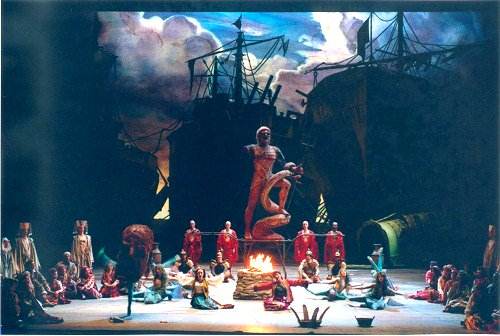S&H Opera review
MOZART: IDOMENEO, PALAIS GARNIER, Paris, April 8th 2002 (FC)
A few opera insiders had heard reports of wobbly wheels on this cart. So some in the audience were not surprised when the wheels fell off the new production of Wolfgang Amadeus Mozart’s early opera Idomeneo at the Palais Garner in Paris. This musically limp and unattractive production was greeted with a good number of boos among the tepid applause of the first night audience on April 8.
The decision of the General Director of the Paris Opera, Hugues Gall, to entrust the stage direction of this production to the Music Director of the Lyon Opera, Ivan Fischer, also the conductor, was an early surprise. Only a few conductors have had the hubris to take on stage direction functions while conducting, the examples of Herbert von Karajan and John Eliot Gardiner come to mind. In a recent magazine interview, Fischer admitted that he had never done such a thing before and, more puzzling, indicated that he wanted to treat this opera in the style of dramatic "grand opera," presumably in the manner of Meyerbeer.
Paris opera-goers, used to the crisp, historically informed performances of William Christie, René Jacobs, Marc Minkowski and others might have sensed trouble hearing the overture played with a slack and uninspired feel. When the curtain opened, the situation did not improve, revealing dismal sets and odd costumes that spanned the range from medieval armor-plate to nun’s habits to gypsy garb – a production without evidence of some unifying artistic idea.
Unfortunately, a good number of very talented American singers had been engaged to sing in this wounded venture and only the star mezzo-soprano Susan Graham managed to make a significant impression. Singing the trouser role of Idemante, she was the only one to sing in a poised and confident Mozartian style and shown gloriously in her role. The gifted soprano Christine Goerke was a raging Elettra (presumably at Mr. Fischer’s direction) but sang her role more in the style of Strauss’ Elektra than Mozart’s. Her last act aria had all the vocal fireworks and heaven-storming passion that might please American audiences but would likely seem over-cooked to French audiences who are more used to singers specializing in the more balanced classical and baroque style. Soprano Mary Mills, who enjoyed success last year as the spoiled Infantin in Zemlinsky’s Der Zwerg at Bastille, was closer to this ideal but also, presumably at the conductor’s direction, sang with outsized effort. Tenor Michael Myer’s Arbace showed no Mozart sensibility or interpretive feel. Donald Litaker, the High Priest, made much of his small role but when his is the best tenor of the three, it is usually an indication of a long night.
The title role was entrusted to the Romanian tenor Marius Brenciu who is making his first (and perhaps last) appearance on the Paris Opera stages. Singing with a tired, pinched voice straining to be heard he cracked several times and simply glossed over all the demanding coloratura in his aria ‘Fuor del mar’. Hired presumably because he has won first prize at practically every vocal competition in sight recently, his performance is perhaps more an indictment of the competition system itself and the dozing judges.
With stage sets that provoked giggles from the audience, vague conducting, ballet sequences that provoked guffaws and hoots, performers seemingly on their own theatrically and costumes that could have been pulled at random from a backstage trunk, it seems that the Opéra’s director, Hugues Gall, has presided over another minor debacle. This reminds some of his decision to have another first-time director, Jeanne Moreau, stage the unfortunate Attila earlier this season. Maybe he should vet his ideas with a few trusted friends before he signs the contracts.
It seems oddly backward that this opera, with a treasure of masterful operatic music accompanied by a libretto lacking much dramatic tension should be played first for the drama and thus leaving the music ignored and ill-attended. Only in the ensembles, where Mozart obliged the actors to stand still and sing to common purpose, could you see the sparks of what might have been.
Frank Cadenhead
A visitor writes in
FYI : Marius Brenciu couldn't "gloss over all the demanding coloratura" in "Fuor del mar", since he sang the second version of this aria, wherethe coloratura is cut altogether.
All the best
Piotr Kaminski
Paris
Photo Credit: Eric Mahoudeau

 Return to:
Return to: